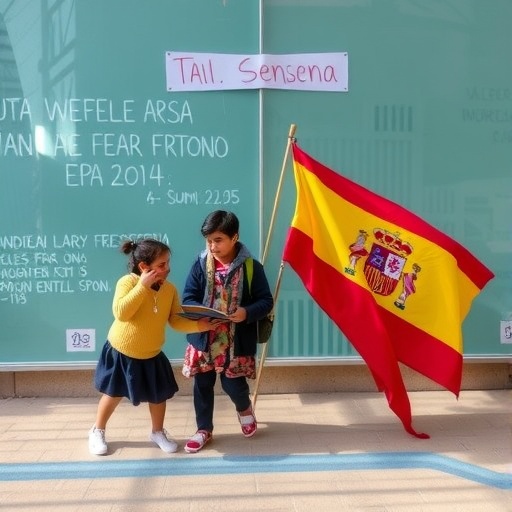In recent years, significant attention has been focused on the Roma community in Spain, a group with a rich historical background yet facing persistent discrimination and misunderstanding. Dr. Juan Jarque Jarque has made history as the first Roma individual to earn a PhD in Contemporary History from Universitat Jaume I, marking a crucial step toward acknowledging and preserving the complex narrative surrounding the Roma people. His dissertation, “Gitanos en Castellón de la Plana. Avecindamiento forzoso, control y desigualdad (1739-1978),” delves into the intricate history of Roma families in Castellón, elucidating their struggles against social exclusion and systemic inequality.
Dr. Jarque’s research offers a critical examination of the historical journey of the Roma in Spain, beginning with their forced settlement outlined in the forced settlement of two Roma families during the 18th century. His work spans nearly 240 years and aims to map out a continuous storyline from the trauma of forced displacement to the bureaucratic inequalities that still affect the community today. This comprehensive analysis is not merely academic; it serves as a foundational narrative that challenges the stereotypes and historical misconceptions about the Roma.
The study chronicles how, from the mid-18th century to 1978, the Roma faced systematic control and socio-economic stratification through legislation and societal bias. Dr. Jarque notes that while the 1978 Spanish Constitution guaranteed equality, it failed to eradicate centuries of ingrained prejudice that manifested through both public sentiment and institutional practices. His investigation highlights the shift from a period of overt discrimination to one where stereotypes are often ingrained in the societal psyche, perpetuating divisions and fostering antigypsyism.
In a contemporary analysis, Dr. Jarque connects his historical findings to modern implications, emphasizing that although the Roma community is recognized as a minority with legal rights, the underlying prejudices persist, affecting their social integration. The stereotypes perpetuated through literature and government narratives over centuries have shaped the public’s perception, framing Roma individuals as outlaws or vagabonds. This long-standing stigma poses numerous barriers to social acceptance and recognition of their contributions to Spanish culture, history, and economy.
Dr. Jarque argues for a reformation in the educational system as a key vehicle for change. By advocating for an inclusive curriculum that integrates Roma history into the mainstream narrative, he proposes a method for dismantling prejudice and fostering mutual understanding. This approach encourages not only recognition of their rich cultural heritage but also allows for a platform where varied identities coexist in harmony, shaping a collective future based on equality and respect.
Furthermore, Dr. Jarque identifies a crucial component of his proposals as the need for active participation from the Roma community in civic life. While there have been initiatives aimed at encouraging Roma individuals to engage more in political processes, such as voting, challenges remain. The representation of Roma persons in political spheres is noticeably low, which points to a disengagement that needs addressing. He sees mixed marriages and grassroots movements as vital to forging deeper institutional connections and broader participation in societal frameworks.
Despite the numerous challenges that the Roma community faces, Dr. Jarque maintains a sense of optimism, especially in light of Spain’s 2021 National Strategy for Equality, Inclusion, and Participation of the Roma People, which outlines specific frameworks for enhancing the social image of Roma and fostering their civic engagement. This collaborative program seeks to unite Roma communities and public entities in the pursuit of equality and opportunity, presenting a strategic avenue for improved outcomes.
As Spain prepares to celebrate the 600th anniversary of the Roma’s presence in the Iberian Peninsula in 2025, Dr. Jarque stresses the importance of recognizing this heritage and the socio-cultural contributions of the Roma. The institutional acknowledgment of their role, alongside historical discrepancies such as ongoing discrimination and the impact of anti-Roma laws, forms a crucial backdrop for educational reform and public discourse. This anniversary serves as a poignant reminder of the historical injustices that continue to reverberate in contemporary society.
The legacy of discrimination faced by the Roma community calls for a nuanced understanding of their generational struggles. Dr. Jarque’s research acts as a bridge to fostering dialogues about racial equality, historical context, and the importance of multiculturalism in contemporary Spain. His work serves not only as a testament to the importance of documenting marginalized histories but also as an urgent call to improve social narratives that encompass all voices.
In conclusion, Dr. Juan Jarque Jarque stands not only as a pioneer in Roma scholarship but also as an advocate for systemic change through education, community involvement, and respectful acknowledgment of cultural diversity. His work lays the groundwork for a future where the contributions and narratives of Roma individuals are celebrated as an integral part of Spanish society, ultimately leading to increased empathy, understanding, and collaboration.
As the conversation surrounding the Roma community evolves, so too must the structures and narratives that have historically confined them. The path toward inclusion hinges upon a societal commitment to foster learning and awareness, ensuring that future generations appreciate the richness of diversity that shapes the tapestry of Spain.
Through his landmark investigation and advocacy for educational reform, Dr. Jarque emphasizes that it is not only about acknowledging the past but also fostering a more equitable future for the Roma people in Spain.
Subject of Research: Roma History and Discrimination
Article Title: The Historical Journey of Roma in Spain: Embracing Diversity and Inclusion
News Publication Date: [Insert Date]
Web References: [Insert References]
References: [Insert References]
Image Credits: Universitat Jaume I of Castellón
Keywords
Roma, discrimination, inclusivity, education, Juan Jarque Jarque, Spain, history, cultural identity




